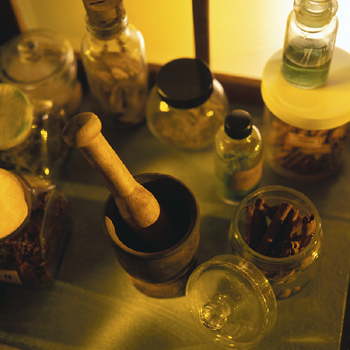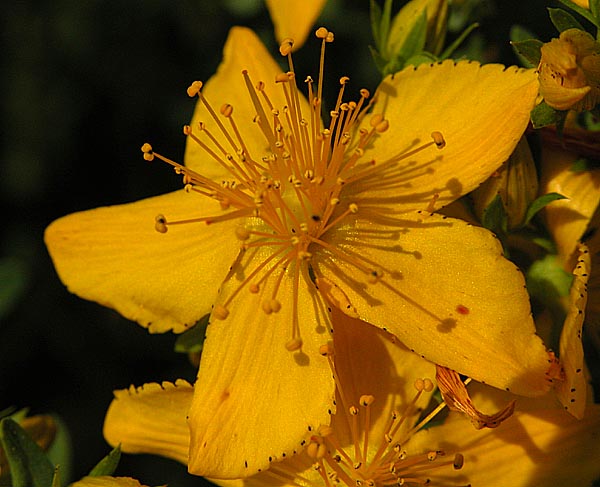Stay Informed
Popular Articles
- Hiatal Hernia: Hidden Cause of Chronic Illness
- Small Intestinal Bacterial Overgrowth (SIBO)
- Applied Lymphology: Unlocking the Secret to Pain Relief
- An Introduction to Constitutional Iridology
- The Low Down on Liver Detoxification
- An Energetic and Emotional Approach to Cancer
- Fat Facts
- Marrow in the Bones
- Blood Type and Nutrition
- Cardiac Herbs: Beyond Hawthorn
Quick Search
The School of Modern Herbal Medicine




A Dose of Common Sense
- 6/20/2009
- Categorized in: General Health
This is page 1 of a four-part article.
 Just prior to the end of the 20th century, herbs were enjoying some very positive press. This came as a welcome suprise, but by the time I wrote this article the favorable press was turning negative again. I firmly believe that the only reason we were receiving the positive attention in the first place was because the pharmaceutical companies had hoped to cash in on the growing popularity of botanical medicine. Having failed to gain substantial market share and reap the profits they desired, the media (which relies on heavy pharmaceutical advertising) are now slamming herbal products again.
Just prior to the end of the 20th century, herbs were enjoying some very positive press. This came as a welcome suprise, but by the time I wrote this article the favorable press was turning negative again. I firmly believe that the only reason we were receiving the positive attention in the first place was because the pharmaceutical companies had hoped to cash in on the growing popularity of botanical medicine. Having failed to gain substantial market share and reap the profits they desired, the media (which relies on heavy pharmaceutical advertising) are now slamming herbal products again.
Even when the media reports were favorable, they emphasized the importance of standardized herbal products, which are produced primarily by European phytopharmaceutical companies. In other words, most of the gains we received from the media attention did not improve public awareness of real herbal medicine. Instead, the pharmaceutical companies have created a hybridization of herbalism and pharmaceutical medicine.
Eclectic Medicine at the Turn of the Twentieth Century
From my point of view hybrid isn't entirely bad, but then my views on the subject are very eclectic. For those of you unfamiliar with that term, I'm alluding to the Eclectic medical movement that began in the mid-1800s and died out in the early part of the twentieth century. In fact, most Americans are completely unaware that the Eclectics were the dominant school of medicine at the turn of the 20th century. If large sums of money from wealthy men with vested interests in synthetic drugs had not been pumped into squelching the Eclectic movement, we would already have an integrated system of healthcare, adopting the best of both modern biomedicine and alternative systems.
This is because the Eclectic doctors were pragmatic. They were careful observers, concerned with what actually worked in clinical practice, not defending a particular philosophical viewpoint. This commendable openness allowed them to blend the diagnostic and therapeutic methods of orthodox medicine, such as surgery and drugs, with herbalism, homeopathy, and naturopathic practices.
At the beginning of this new millennium, we are witnessing a resurgence of the Eclectic point of view. Doctors who are seeking to utilize herbs, homeopathics, massage, meditation and other natural methods in conjunction with drugs and surgery are eclectic in their thinking. Unfortunately, some of the principles and practices that make natural health care powerful and effective get lost in the process of integration. Still, I think that the process should and will continue in spite of unrelenting economic opposition from powerful pharmaceutical interests.
Just the Facts, Please
It is ironic that the side effect warnings so clearly stated for drugs in TV, radio and magazine ads are virtually ignored, while the contraindications and other issues associated with herbs are routinely exaggerated. But people have been known to “strain at gnats while swallowing camels” for a long time.
 Let's start with some negative reports about St. John's wort failing to relieve severe depression. This negative publicity blatantly ignores two facts. First, St. John's wort was never recommended for severe depression in the first place, and secondly, the placebo performed better than both the drug and the herb in the study. What the headline should have said is “Zoloft and St. John's wort fail to relieve serious depression.” Somehow, the fact that Zoloft didn't do any better than St. John's wort was omitted from the story.
Let's start with some negative reports about St. John's wort failing to relieve severe depression. This negative publicity blatantly ignores two facts. First, St. John's wort was never recommended for severe depression in the first place, and secondly, the placebo performed better than both the drug and the herb in the study. What the headline should have said is “Zoloft and St. John's wort fail to relieve serious depression.” Somehow, the fact that Zoloft didn't do any better than St. John's wort was omitted from the story.
Of course, I was never happy with the media hype about St. John's wort in the first place. St. John's wort is merely one of many herbs available to help depression. In a recent article in the Journal of the American Herbalists Guild, David Winston listed 21 other herbs that can be used as antidepressants, plus ten additional plants that can be used as adjunctive therapy. Each of these herbs can be used to effectively treat different kinds of depression, depending on the cause and nature.
The rest of our herbs for depression are largely ignored because they have never received media attention, demonstrating that Paul Bergner (editor of Medicinal Herbalism) was right when he stated that modern medicine is impoverishing herbalism. The public has been “trained” to accept biomedical research as the “truth” or acceptable evidence, while ignoring the basic premise of the Eclectics: “What actually works in clinical practice.”
A similar situation arose with kava, an herb that has been safely used by Polynesians for centuries. Kava has been accused of causing liver damage. The evidence that kava can cause liver damage is scanty. It appears that in rare cases, it may cause stress to the liver (hepatotoxicity). And, those cases all tend to involve strong concentrates distributed in Europe and used with other hepatotoxic drugs. To put this into better perspective, lots of things that Americans regularly consume are hepatotoxic. Alcohol is a leading example. One of the worst offenders is acetaminophen (sold as Tylenol), which is known to destroy both liver and kidney tissue, but you don't see any warnings in the press about that.
If we were to compare the relative safety and effectiveness of kava kava and popular drugs used to treat anxiety, I'm certain we would find that kava kava is just as effective and much safer. But, this discussion is not “allowed” because kava is not FDA approved for the treatment of anxiety. We have created a system of regulation that favors the powerful economic interests of the drug companies, and disfavors the use of whole plants.
In between extremes of “herbs are dangerous” and “it can't hurt you, it's natural” lies the truth. A dose of reason and common sense is needed to clear up the muddied waters of public opinion. So, in an effort to shed some light on this subject, this article will address the issues of herbal toxicity and standardization.
